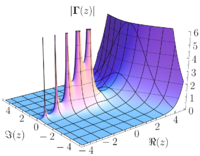| Mathematical analysis → Complex analysis |
| Complex analysis |
|---|
 |
| Complex numbers |
| Complex functions |
| Basic theory |
| Geometric function theory |
| People |

In complex analysis, a branch of mathematics, Morera's theorem, named after Giacinto Morera, gives an important criterion for proving that a function is holomorphic.
Morera's theorem states that a continuous, complex-valued function f defined on an open set D in the complex plane that satisfies for every closed piecewise C1 curve in D must be holomorphic on D.
The assumption of Morera's theorem is equivalent to f having an antiderivative on D.
The converse of the theorem is not true in general. A holomorphic function need not possess an antiderivative on its domain, unless one imposes additional assumptions. The converse does hold e.g. if the domain is simply connected; this is Cauchy's integral theorem, stating that the line integral of a holomorphic function along a closed curve is zero.
The standard counterexample is the function f(z) = 1/z, which is holomorphic on C − {0}. On any simply connected neighborhood U in C − {0}, 1/z has an antiderivative defined by L(z) = ln(r) + iθ, where z = reiθ. Because of the ambiguity of θ up to the addition of any integer multiple of 2π, any continuous choice of θ on U will suffice to define an antiderivative of 1/z on U. (It is the fact that θ cannot be defined continuously on a simple closed curve containing the origin in its interior that is the root of why 1/z has no antiderivative on its entire domain C − {0}.) And because the derivative of an additive constant is 0, any constant may be added to the antiderivative and the result will still be an antiderivative of 1/z.
In a certain sense, the 1/z counterexample is universal: For every analytic function that has no antiderivative on its domain, the reason for this is that 1/z itself does not have an antiderivative on C − {0}.

